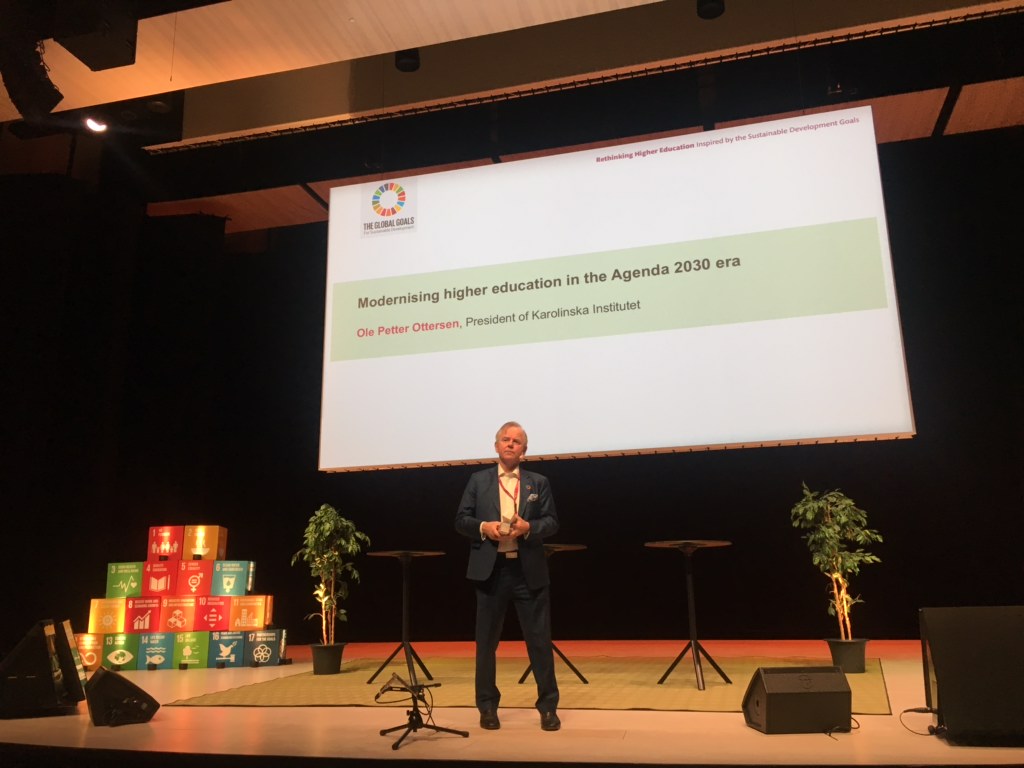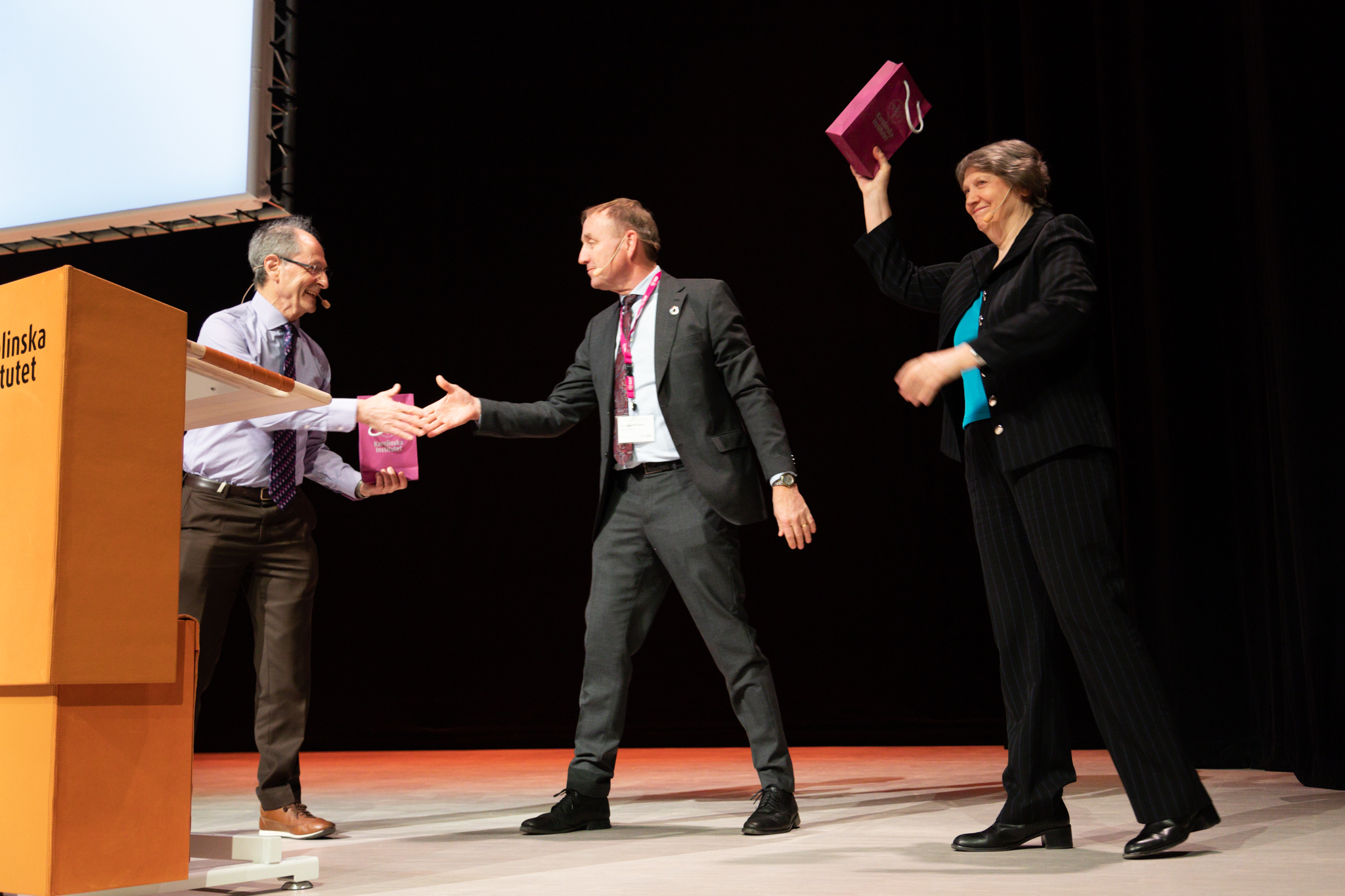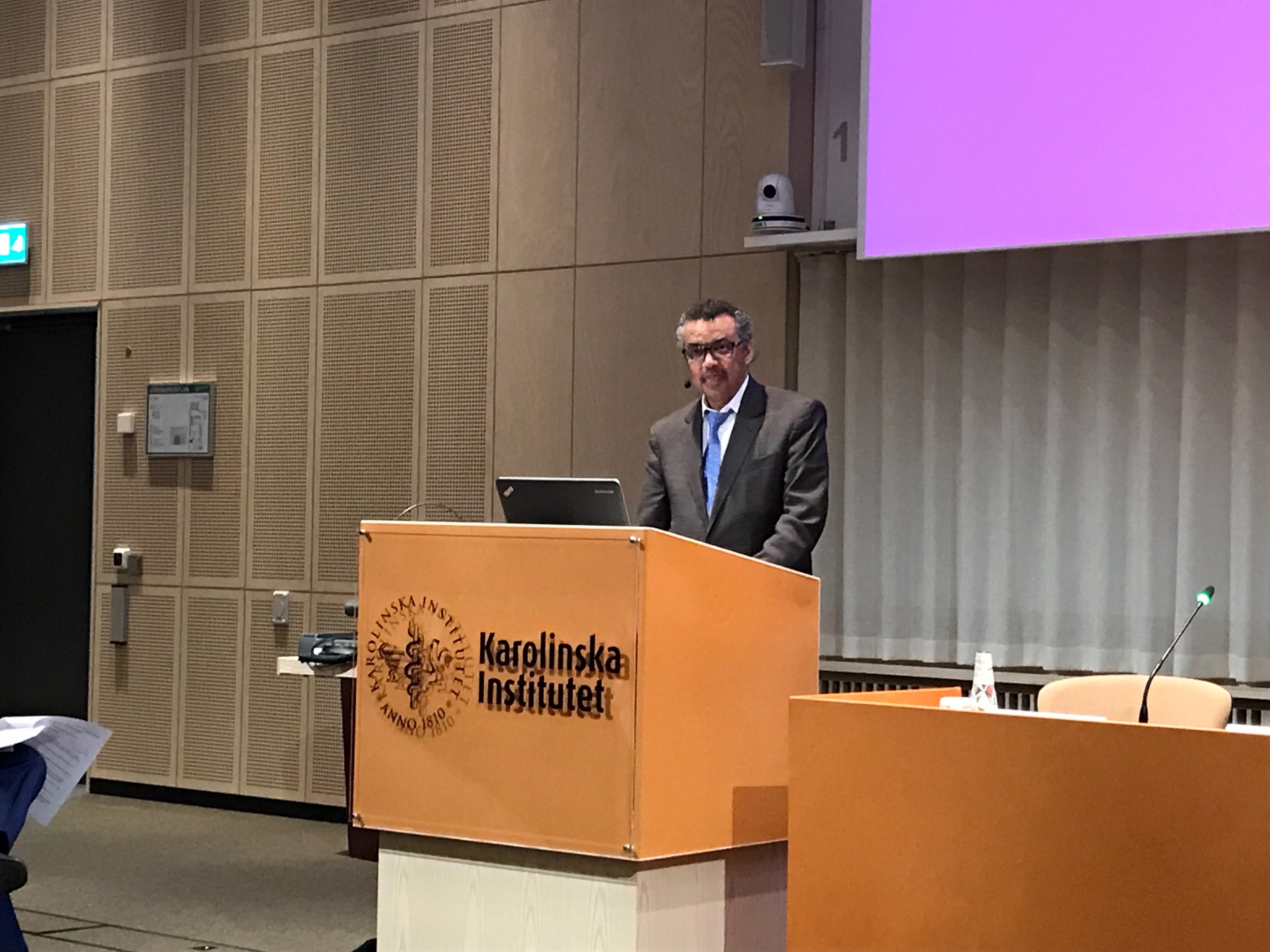We are facing health challenges of increasing complexity
Läs svensk version längre ner på sidan
“We are facing health challenges of increasing complexity”. This is the title of an article in Dagens Medicin 9 April (original title: “Vi ställs inför mer komplexa hälsoutmaningar”). This article is authored by Dr. Tedros Adhanom Ghebreyesus, Director-General WHO, Lena Hallengren, Swedish Minister for Health and Social Affairs, and Peter Eriksson, Minister for International Development Cooperation.
The word “complexity” catches much of what is currently happening in the realm of human health. We are in the midst of a slow revolution where questions related to health permeate arenas and sectors where such questions previously did not necessarily belong. This revolution is driven by new knowledge: we know that health is impacted by a range of factors that extend well beyond lifestyle and genetics. The revolution is driven by an increased prioritization of health and wellbeing and a growing attention to the gross inequities worldwide when it comes to access to health and health care. And it is driven by the extant and impending effects of human activity: we are approaching and transgressing planetary boundaries, forcing us to see health in a much broader context than before.
Cross-sectoral
In sum, health is becoming increasingly cross-sectoral. Climate changes are impacting human health, with heat waves being a concern even here in Sweden. Migration and demographic changes require that we think anew on how to uphold health as a human right. And we need to consider the socio-economic, commercial, and political determinants of health. All of these determinants impinge on and often constrain the choices we make when it comes to our own lifestyle.
The complexity of health is brought to the fore in UN Agenda 2030 with its 17 Sustainable Development Goals (SDGs). While goal 3 addresses health directly, health is very much in evidence in as many as 14 of the 17 goals, and in more than 50 out of the 169 different targets. The SDGS inspire us – and compel us – to view health in a broad setting. And there should be no misunderstanding: the SDGs cannot be dismissed as something remote. They concern us all – both directly and indirectly. Directly – because the ambitions embedded in the SDGs are relevant for our own health care system here in Sweden, and – indirectly – because we as a university must take a responsibility that extends beyond our national border. We must strive for a better health for all, as explicitly stated in our new vision.
Complexity of health
To stay relevant as a university we must be willing to address the increasing complexity of health, not least when it comes to our education of future health professionals and leaders. This was among the issues addressed in our conference “Rethinking higher education” on Saturday, March 30. In collaboration with Göteborgs universitet, the Royal Institute of Technology in Stockholm (KTH) and The Royal Swedish Academy of Science (KVA), we asked how we, students, teachers, researchers and other higher education professionals, can take responsibility for, and be inspired by, the Sustainable Development Goals of the UN Agenda 2030. Among the invited guests and speakers were the Rt Hon Helen Clark – former prime minister of New Zealand and head of UNDP – and Sir Michael Marmot – chair of the 2008 WHO commission “Closing the gap in a generation”. More than 500 participants – many of them students – attended the plenary lectures as well as a range of workshops dedicated to the overriding question of how educational programs can be better adapted to societal challenges. The concrete suggestions that came out of these workshops will be theme for an upcoming blog.
Work more closely
Back to the Director-General of the World Health Organization, Dr. Tedros Adhanom Ghebreyesus. Dr. Tedros visited our campus on April 9. He was kind enough to accept my invitation to give a speech on Research and Higher Education for Health – in the context of Agenda 2030. Together with students, teachers, researchers and other KI staff, Dr. Tedros discussed how WHO and KI can work more closely together in order to realize the ambitions embedded in the UN Agenda 2030 and in WHO’s own priorities. The event was arranged in Biomedicum – our new hub for basic experimental research. This was an appropriate venue as much of the discussion revolved around the significance of basic research in our endeavors to tackle current and future challenges in the realm of global health.
After taking office Dr Tedros has taken steps to lift research higher up on WHO’s agenda. He has appointed a chief scientist and established an academy for discussions on issues related to research and education. This bodes well for the future collaboration between WHO and KI. This collaboration is already quite extensive, with three WHO collaborating centres currently affiliated with our university. But we can certainly do more if we let ourselves be inspired by the complexity and intricacy of the challenges ahead.
Please see KI’s website for more information about Dr Tedros visit.

Rethinking Higher Education March 30.

Rethinking Higher Education Conference: Michael Marmot, Carl Johan Sundberg (moderator, KI) and Helen Clark.

WHO’s Director-General Dr. Tedros spoke in Biomedicum April 9.
Vi ställs inför mer komplexa hälsoutmaningar
“Vi ställs inför mer komplexa hälsoutmaningar”. Det var rubriken på en debattartikel publicerad i Dagens Medicin den 9 april, underskriven av WHO:s generaldirektör Dr. Tedros Adhanom Ghebreyesus, socialminister Lena Hallengren och ministern för internationellt utvecklingsarbete Peter Eriksson.
Ordet “komplex” fångar mycket av det som händer just nu. Vi är mitt i en långsam revolution där frågor relaterade till hälsa i allt högre grad integreras i sektorer som tidigare var helt separerade från detta. Den här revolutionen drivs framåt av ny kunskap: vi vet att hälsan påverkas av en rad faktorer som sträcker sig långt utöver livsstil och genetik.
Revolutionen drivs av en ökad prioritering av hälsa och välfärdsfrågor och en ökande medvetenhet om de stora ojämlikheterna vi ser världen över när det gäller tillgång till hälso- och sjukvård. Och den drivs också av människans egen påverkan på vår sam- och framtid: Vi närmar oss och till och med överskrider vår planets gränser.
Allt detta tvingar oss att se hälsa i ett mycket bredare sammanhang än tidigare.
Sammantaget blir hälsa alltmer sektorsövergripande. Klimatförändringar påverkar människors hälsa, där värmeböljor skapar oro även här i Sverige. Migration och demografiska förändringar kräver att vi tänker på hur hälsan ska kunna upprätthållas som en mänsklig rättighet. Och vi måste överväga de socioekonomiska, kommersiella och politiska determinanterna för hälsa. Alla dessa determinanter påverkar och begränsar ofta de val vi gör när det gäller vår egen livsstil.
Hälsokomplexiteten framhävs i FN:s Agenda 2030 med sina 17 hållbarhets- och utvecklingsmål (SDG). Mål 3 handlar om hälsa direkt, men hälsa finns också med direkt eller indirekt i ytterligare 13 av målen och i mer än 50 av de 169 olika delmål. Hållbarhetsmålen inspirerar oss – och tvingar oss – att se hälsa i en bred kontext. Och det finns inte längre någon tvekan: Dessa mål kan inte avfärdas som något avlägset och de berör oss alla.
I samarbete med Göteborgs universitet, Kungliga Tekniska Högskolan i Stockholm (KTH) och Kungliga Svenska vetenskapsakademin (KVA), arrangerade KI konferensen “Rethinking higher education” lördagen den 30 mars. Här frågade vi hur vi, studenter, lärare, forskare och andra medarbetare kan ta ansvar för och inspireras av målen i FN:s agenda 2030.
Bland de inbjudna gästerna och talarna fanns Helen Clark – tidigare premiärminister för Nya Zeeland och chef för UNDP – och Michael Marmot – ordförande för WHO-kommissionen 2008 “Closing the gap in one generation”. Mer än 500 deltagare – många av dem studenter – deltog i plenumföreläsningarna och i ett flertal workshops som tog upp den övergripande frågan om hur högre utbildning bättre kan anpassas till samhällsutmaningar i FN:s Agenda 2030.
En dryg vecka senare, den 9 april, var det dags för nästa spännande besök på KI:s campus Solna. WHO:s generaldirektör Dr Tedros var vänlig nog att acceptera min inbjudan att tala om forskning och högre utbildning för hälsa – inom ramen för Agenda 2030 och tillsammans med studenter, lärare, forskare och andra KI-anställda,
Dr. Tedros tog bland annat upp hur WHO och KI kan arbeta närmare tillsammans för att förverkliga ambitionerna i FN:s Agenda 2030 och i WHO:s egna prioriteringar. Evenemanget arrangerades i Biomedicum – vårt nya nav för grundläggande experimentell forskning och en lämplig plats eftersom så mycket av diskussionen handlade om betydelsen av grundforskning i våra ansträngningar för att ta itu med nuvarande och framtida utmaningar inom den globala hälsan.
Efter tillträdet som GD för WHO har Dr Tedros vidtagit åtgärder för att lyfta forskning högre upp på organisationens dagordning. Han har utsett en chefsforskare och etablerat en akademi för diskussioner om frågor som rör forskning och utbildning. Detta skapar en utmärkt och relevant ingång till det framtida samarbetet mellan WHO och KI – ett samarbete är redan ganska omfattande, med tre WHO collaborating centers knutna till KI.
Men vi kan göra mer om vi låter oss inspireras av komplexiteten i de utmaningar vi står inför.
Läs gärna mer om Dr. Tedros KI-besök på vår webbplats.


0 comments